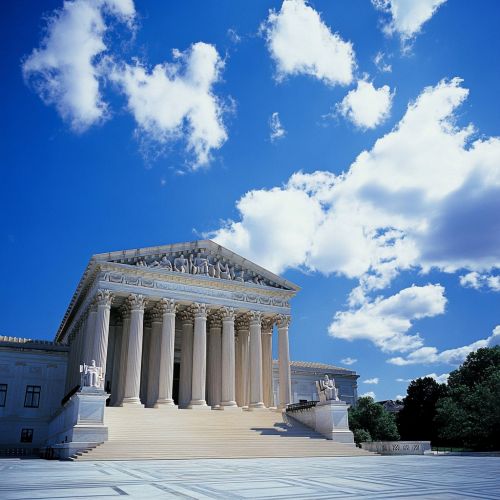United States Solicitor General: Difference between revisions
(Created page with "== Overview == The United States Solicitor General is a pivotal legal position within the federal government, responsible for representing the United States in cases before the Supreme Court. Established in 1870, the Office of the Solicitor General is part of the Department of Justice and plays a crucial role in shaping the legal landscape of the nation. The Solicitor General is often referre...") |
No edit summary |
||
| Line 43: | Line 43: | ||
The United States Solicitor General plays a critical role in the federal government's legal framework, influencing the development of law and policy through strategic litigation before the Supreme Court. As the legal landscape continues to evolve, the Solicitor General's office remains a key player in shaping the nation's judicial future. | The United States Solicitor General plays a critical role in the federal government's legal framework, influencing the development of law and policy through strategic litigation before the Supreme Court. As the legal landscape continues to evolve, the Solicitor General's office remains a key player in shaping the nation's judicial future. | ||
[[Image:Detail-98863.jpg|thumb|center|The United States Supreme Court building in Washington, D.C., with its iconic neoclassical architecture and steps leading up to the entrance.]] | |||
== See Also == | == See Also == | ||
Revision as of 20:58, 20 October 2024
Overview
The United States Solicitor General is a pivotal legal position within the federal government, responsible for representing the United States in cases before the Supreme Court. Established in 1870, the Office of the Solicitor General is part of the Department of Justice and plays a crucial role in shaping the legal landscape of the nation. The Solicitor General is often referred to as the "tenth justice" due to their significant influence on the Court's docket and decisions.
History and Establishment
The position of Solicitor General was created by the Judiciary Act of 1870, which aimed to improve the efficiency of the federal government's legal operations. Prior to this, the Attorney General was responsible for all litigation involving the United States, a task that had become increasingly burdensome as the nation expanded. The creation of the Solicitor General's office allowed for a more focused and specialized approach to Supreme Court litigation.
Role and Responsibilities
The primary responsibility of the Solicitor General is to supervise and conduct government litigation in the Supreme Court. This includes deciding which cases the government will appeal, determining the legal positions the government will take, and personally arguing cases of significant importance. The Solicitor General also reviews cases in the lower courts to determine their potential impact on federal law and policy.
Case Selection
The Solicitor General has the discretion to decide which cases the government should appeal to the Supreme Court. This involves a careful analysis of legal principles, the potential for establishing precedent, and the broader implications for federal policy. The Solicitor General must balance the interests of the executive branch with the need to maintain a consistent and coherent legal strategy.
Briefs and Oral Arguments
In addition to selecting cases, the Solicitor General is responsible for preparing and submitting briefs to the Supreme Court. These documents outline the government's legal arguments and provide a detailed analysis of the relevant legal issues. The Solicitor General or their deputies often present oral arguments before the Court, engaging directly with the justices to clarify and defend the government's position.
Influence and Impact
The Solicitor General's influence extends beyond individual cases. By shaping the government's legal strategy, the Solicitor General can impact the development of constitutional law and federal policy. The office has been involved in landmark cases such as Brown v. Board of Education, which addressed racial segregation in public schools, and Roe v. Wade, which dealt with abortion rights.
Relationship with the Supreme Court
The Solicitor General maintains a unique relationship with the Supreme Court, characterized by mutual respect and trust. The Court often seeks the Solicitor General's opinion on cases that involve complex legal issues or significant federal interests. This relationship is reflected in the high success rate of the Solicitor General's cases before the Court, as well as the frequent requests for the office to participate as an amicus curiae, or "friend of the court."
Appointment and Tenure
The Solicitor General is appointed by the President and confirmed by the Senate. While there is no fixed term, the Solicitor General typically serves at the pleasure of the President. This allows for continuity in legal strategy while also enabling the office to adapt to changes in administration and policy priorities.
Notable Solicitors General
Throughout its history, the Office of the Solicitor General has been held by individuals who have gone on to achieve significant legal and political prominence. Notable Solicitors General include Thurgood Marshall, who later became the first African American Supreme Court Justice, and Elena Kagan, who also ascended to the Supreme Court.
Challenges and Criticisms
The role of the Solicitor General is not without challenges and criticisms. Balancing the interests of the executive branch with the need for impartial legal advocacy can be complex. Additionally, the office must navigate the political implications of its legal positions, particularly in cases involving contentious social or constitutional issues.
Conclusion
The United States Solicitor General plays a critical role in the federal government's legal framework, influencing the development of law and policy through strategic litigation before the Supreme Court. As the legal landscape continues to evolve, the Solicitor General's office remains a key player in shaping the nation's judicial future.

